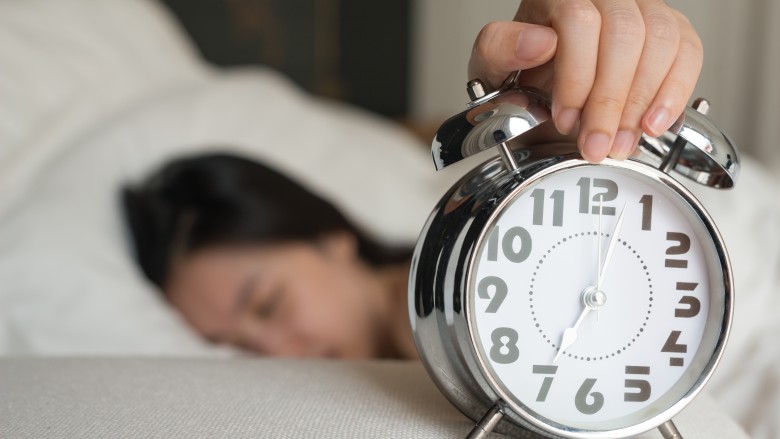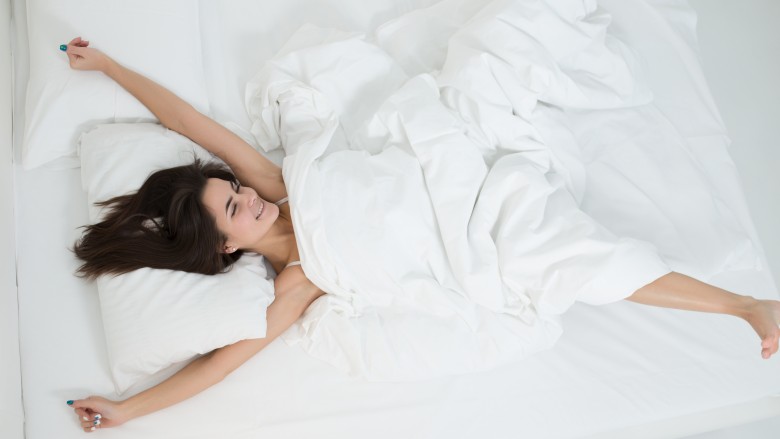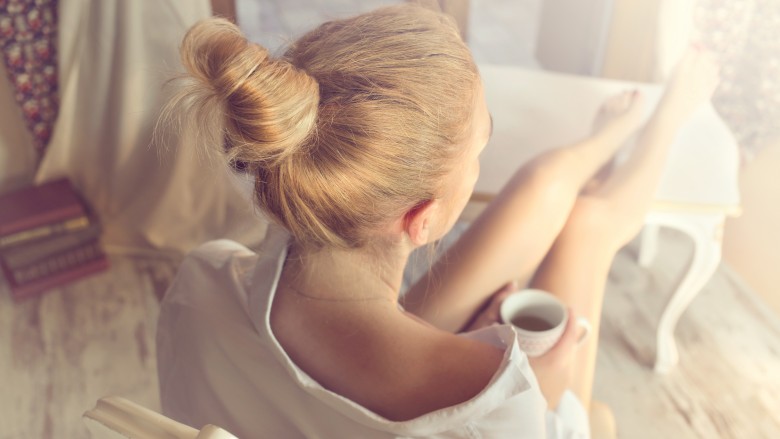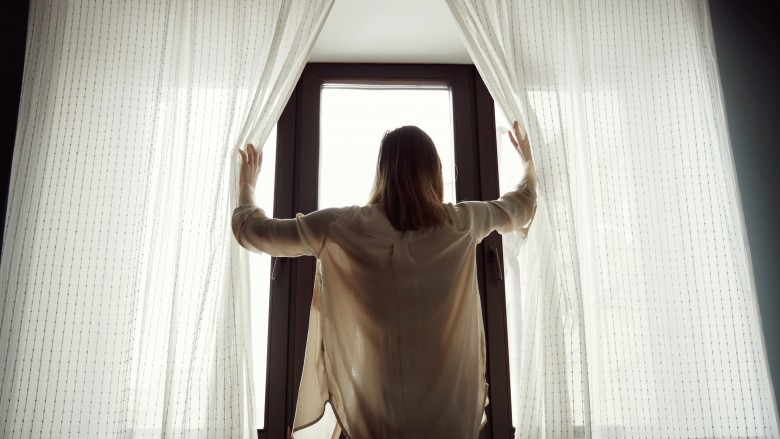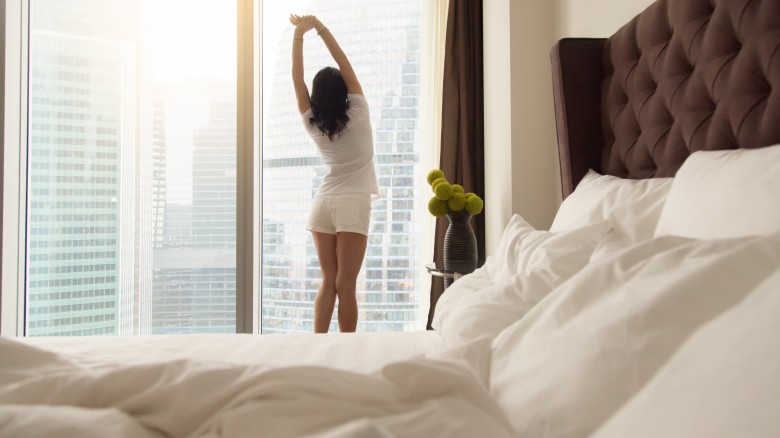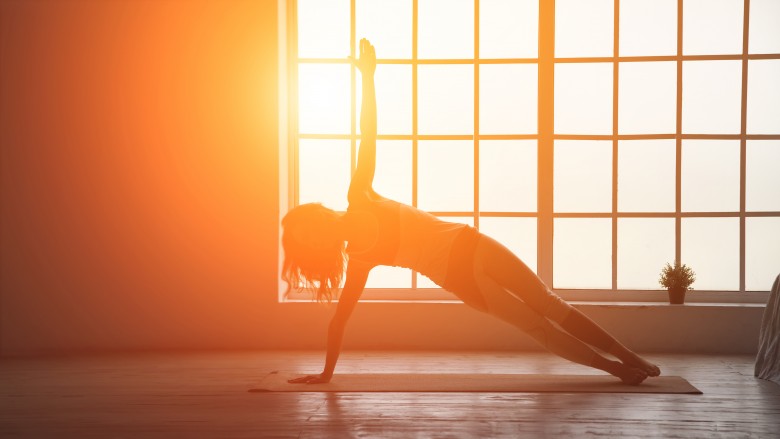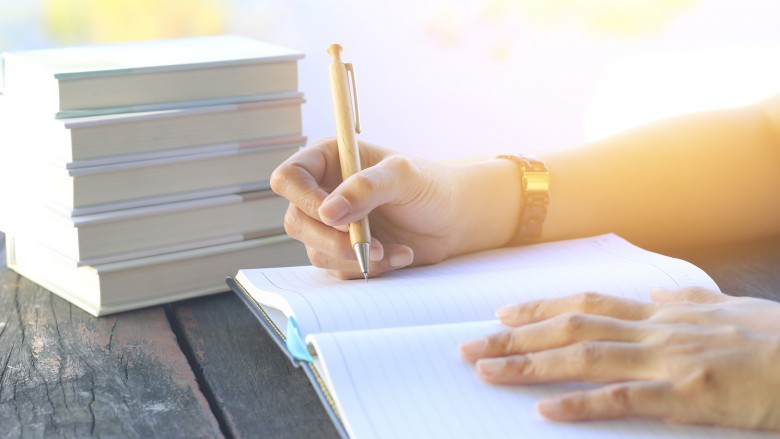11 Things To Avoid Doing When You First Wake Up
The alarm sounds and you're off. The day has begun. Some of us pop out of bed, ready to get going, while others of us dread the thought of leaving the warm comfort of our cozy nest. Everyone has their morning routine. If you're like me, you're an early riser, coffee in hand within minutes of getting up, checking social media and emails to see what was missed while trying to catch a few hours of sleep before work. Admittedly, my routine is not necessarily the healthiest, at least according to experts.
Perhaps it's time to try something different and eliminate some habits that aren't the most beneficial to your health, your state of mind, or the productivity of your day. Here are a few things to avoid doing when you first wake up, so you will rise and truly shine.
Don't reach for the snooze button
Yeah, I know, hitting the snooze button is a given for some of us. I'm guilty of that one. I've learned, however, that five or ten more minutes of sleep — or more, if you hit the snooze button multiple times — may sound like a good idea, but experts warn that it's a bad habit that should be broken.
Sleep expert Timothy Morgenthaler told Business Insider's Jessica Orwig that "most sleep specialists think that snooze alarms are not a good idea." He explained that if you hit the snooze button, you might enter into a sleep cycle you won't likely finish. What's the big deal, you ask? It seems that if you don't finish that cycle, you'll awake groggy rather than refreshed. The best thing for an alert day is to avoid the temptation completely. Instead, opt for getting to bed a little earlier the night before to get sufficient rest so you'll rise with ease and not need to hit snooze.
Don't reach for the phone to check email, social media
OK, I admit it. In the past, after I hit the snooze button a few times, I reached for my cellphone to catch up. It turns out I'm not alone. Apparently, 63 percent of smartphone users age 18-29 admit to taking a device to bed with them at night, which of course makes it really easy to reach for it first thing. Shoot, I used to take my laptop to bed with me to do a little Netflix binging before falling asleep, along with my cellphone.
Julie Morgenstern, author of the book Never Check Email in the Morning, told The Huffington Post that if you start your morning by getting online, "You'll never recover. Those requests and those interruptions and those unexpected surprises and those reminders and problems are endless," she said. "There is very little that cannot wait a minimum of 59 minutes." For those of you who rely on your cellphone as an alarm clock, go old-school and get yourself an old-fashioned alarm clock, leaving your phone in another part of the house. That way you won't be tempted to reach for it first thing. Oh, and do your Netflix binging somewhere other than in your bed.
Instead of remaining all curled up, stretch it out
Another suggestion to launch into your day right, is to stretch while you're still in bed. Don't stay all curled up. Instead, stretch out wide and take up the whole bed. According to Harvard psychologist Amy Cuddy, stretching out wide not only gets those muscles limbered up, it is a way to build confidence as you begin your day.
During a talk at New York's 92Y, Cuddy suggested that the people who wake up with their arms in a V-shape "are super happy, like annoyingly happy." On the other hand, she noted that there is evidence that people who wake up in the fetal position "wake up much more stressed out." In fact, there is evidence that stretching first thing helps to increase flexibility, improve circulation and relieve tension, so stretch it out!
Don't forget to hydrate
Once you're out of bed, don't forget to grab a glass or two of water to hydrate. After all, you've (hopefully) gone seven to eight hours without water, and your body is likely in need of hydration. Drinking water not only helps you you wake up, it can also get your metabolism moving in the right direction. Add lemon or lime — if you don't love the taste of plain water — which also helps to flush out the liver.
Sacred Source Nutrition suggests drinking water at room temperature because cold water can shock your system and prevent all of the many health benefits from taking effect. Besides helping to detox your liver, drinking water first thing can help with constipation, prevent UTIs, help with weight loss, boost your immune system, battle bad breath and strengthen the brain, among other things.
So start your day with water. It's one of the best things you can do for your body.
Don't grab coffee right away
Many of you won't like hearing this, but drinking coffee before 9:30 a.m. is not a good idea. I know, I know. Some of us think we can't get started without a cuppa joe from the get go. Confession: It's my favorite part of my morning routine.
However, some scientists have found that our bodies produce higher amounts of the stress hormone cortisol, which helps us stay alert and energized, between 8 a.m. and 9 a.m. By drinking coffee before or during that magic hour, the caffeine will force your body to produce less cortisol in the early morning. So for most people, the best time to drink coffee is after 9:30 a.m.
Instead, enjoy that lemon water, anticipating the joy of pouring that perfect cup of coffee later on in the day.
Don't prepare for your day in the dark
I'm an early bird, and it's usually dark when I get up, especially during the winter months. Honestly, the last thing I want to do is turn on a bright light, but experts say that's precisely what I should be doing. Natalie Dautovich of the National Sleep Foundation told The Huffington Post that we need to turn those lights on in the winter and open up the curtains in the summer to help us get our internal clocks adjusted properly.
Because our bodies' internal clocks are so sensitive to light, getting up and ready in the dark can send a signal to your body that it's still nighttime. This will only keep you feeling groggy and out of it, rather than alert, energized and in a really good mood. This habit of letting the light shine is particularly beneficial for those of us who suffer from the winter blues.
Don't leave your bed unmade
Making your bed in the morning is a really good habit to start if you don't already make that a priority. Yes, whether you make your bed or not might seem like a trivial detail for many of you. I mean, who's going to notice if you don't make your bed? Besides, you're just going to get back in it in a few hours and mess it up again, right?
Charles Duhigg, author of The Power of Habit and Smarter Faster Better, disagrees. He suggests that forming good habits, including making your bed in the morning, is associated with increased productivity throughout the rest of the day. Duhigg claims making your bed is a "keystone habit" that can spark "chain reactions that help other good habits take hold."
Psychology Today also reports that "bed makers are more likely to like their jobs, own a home, exercise regularly and feel well rested." It doesn't take but a minute and you'll be happy you made the effort.
Don't skip breakfast
For many years, I skipped breakfast because I wrongly assumed that if I didn't eat something first thing in the morning, I would eat fewer calories throughout the day. Besides, I was rarely hungry before 11 a.m. I came to learn that wasn't a great idea and while I'm still not very hungry early on in the morning, I make it a habit to have some oatmeal or yogurt with fruit before I head to work.
It seems I wasn't alone. A 2011 study by the market research company NPD group found that about 18 percent of males and 13 percent of females between the ages of 35 and 54 skip breakfast regularly. My idea that skipping breakfast would help with weight loss has turned out to be a complete fallacy. In fact, one study found that a group of people in the study who ate breakfast as their largest meal lost an average of 17.8 pounds over three months, as Live Science reported. Those who ate their largest meal at dinner only lost an average of 7.3 pounds each over the same time period.
Other studies find that eating breakfast can help prevent diabetes and heart disease, and improve performance and memory. An added benefit from eating breakfast every morning is the assurance that you are receiving a more nutritionally complete diet — one higher in nutrients, vitamins and minerals. I guess Mom was right. Breakfast really is the most important meal of the day, so think about making it a priority.
Don't forget to exercise and ease the mind
We all know exercise is a necessity to health and well-being, but many experts say making exercise a part of your morning routine is particularly beneficial. Cedric X. Bryant, PhD, chief exercise physiologist of the American Council on Exercise, says there are added benefits to working out in the morning rather than later in the day. "Morning exercisers tend to stick with their exercise habit," he told WebMD. "By doing the bulk of exercise first thing in the morning, you get your exercise in before other distractions can intrude. We can all relate to that — because once the day gets going, it's hard to get off the treadmill called life." Yeah, I can relate to that.
You might also try to bit of meditation to get your day going. Andy Puddicombe, co-founder of Headspace, a digital health and wellbeing platform, says 15 minutes of meditation in the morning will "ensure it gets done, gets rid of any grogginess from your sleep and is a great way to start the day. It will also mean you are more likely to be mindful throughout the day."
Don't forget to journal it out
As a writer, I can't imagine going a day without journaling. It helps me work out my frustrations, get the creative juices flowing and gives me a place to jot down my dreams, aspirations and what are obviously brilliant ideas. It seems this particular habit of mine is a good one. Virginia Berninger, professor of educational psychology at the University of Washington, says the physical act of writing in a journal with a pen stimulates a much larger portion brain, especially the thinking and "working memory" regions, than typing.
I also like to jot down five things for which I am grateful. It has changed my life, in many ways. Research has found that a gratitude journal helps open the doors to relationships, boost self-esteem, generate a better night's sleep, reduce frustrations, and improve physical and psychological health, among other things. I know my day is always better if I begin with a grateful heart for all the good things and people in my life.
It's all up to you
Some of these suggestions may seem really challenging, but for a great start to your day, these recommendations that can significantly transform your life. It's up to you. Have a great day!


